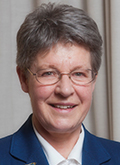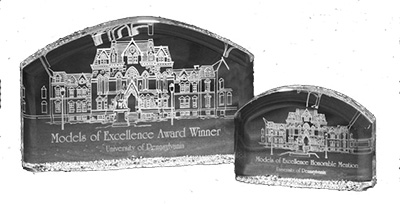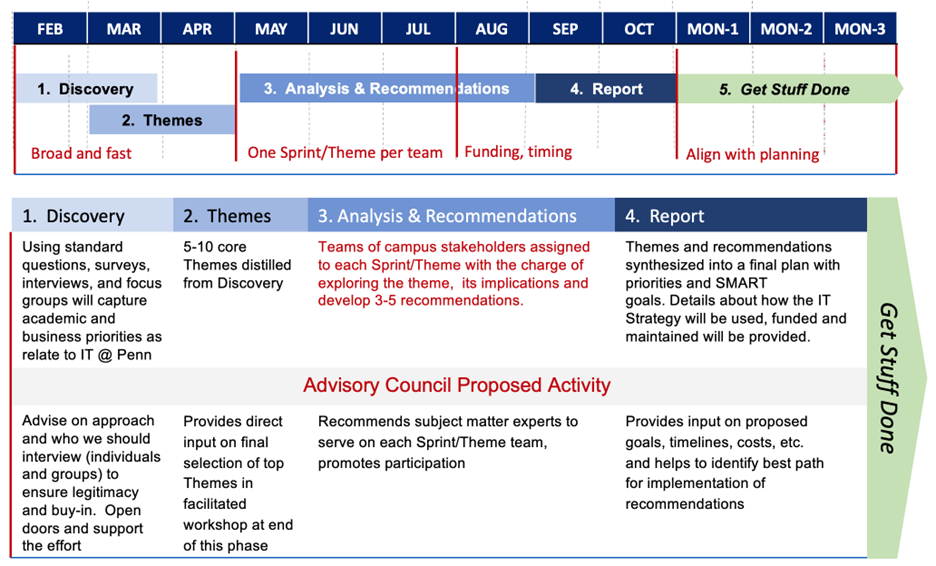Penn’s 2023 Commencement Speaker and Honorary Degree Recipients
Award-winning singer, actress, and songwriter Idina Menzel will be the speaker at the 2023 University of Pennsylvania Commencement on Monday, May 15, 2023. She and five other individuals will each receive an honorary degree from Penn.
Medha Narvekar, Penn’s Vice President and University Secretary, has announced the 2023 honorary degree recipients and the commencement speaker for the University of Pennsylvania. The Office of the University Secretary manages the honorary degree selection process and University Commencement.
The 267th Commencement begins at 10:15 a.m. on Monday, May 15, and will be preceded by student and academic processions through campus. The ceremony will feature the conferral of degrees, the awarding of honorary degrees, greetings by University officials, and remarks by the commencement speaker. It will be streamed live on the Penn website. For University of Pennsylvania Commencement information, including historical information about the ceremony, academic regalia, prior speakers and honorary degree recipients, see www.upenn.edu/commencement.
Idina Menzel
 Idina Menzel is a Tony-Award winning actress, singer/songwriter, producer, and author whose Broadway career began when she originated the role of Maureen in the popular musical Rent. She subsequently became widely known for playing the original Elphaba, the Wicked Witch of the West, in the hit musical Wicked, for which she won a Tony Award in 2004.
Idina Menzel is a Tony-Award winning actress, singer/songwriter, producer, and author whose Broadway career began when she originated the role of Maureen in the popular musical Rent. She subsequently became widely known for playing the original Elphaba, the Wicked Witch of the West, in the hit musical Wicked, for which she won a Tony Award in 2004.
Ms. Menzel was the voice of Elsa in Disney’s Oscar-winning Frozen, the second highest grossing animated film of all time. She sang the film’s song “Let It Go,” which became an instant international phenomenon and won the Oscar for Best Original Song in 2014. The track reached #5 on the Billboard Hot 100, making Menzel the first artist to achieve both a Billboard Top 10 hit and a Tony Award for acting.
Among Ms. Menzel’s numerous other stage and screen acting credits include her role as Adam Sandler’s wife in the critically acclaimed film Uncut Gems; the reprisal of her leading role as Elsa in Frozen 2; Disney’s Enchanted and its sequel, Disenchanted, and theater performances in Skintight, If/Then, Hair, Aida, and many more. In late 2022, Ms. Menzel released the documentary, Idina Menzel: Which Way to the Stage? which follows her on a national tour as she juggles being a working mom with a grueling tour schedule and concludes with her lifelong dream of headlining Madison Square Garden.
A skillful songwriter, Ms. Menzel’s prolific recording career includes multiple cast albums and solo albums. As a live performer, she has been accompanied by symphony orchestras around the world. In March 2012, Ms. Menzel released a CD and DVD, Idina Menzel Live: Barefoot at the Symphony, a concert with an orchestra led by the late legendary composer/conductor Marvin Hamlisch, filmed at the Royal Conservatory’s Koerner Hall in Toronto, Canada.
In 2010, Ms. Menzel co-founded A BroaderWay Foundation, which offers girls from underserved communities an outlet for self-expression and creativity through arts-centered programs. The emphasis is on building self-esteem, developing leadership qualities, and striving for personal and social achievement. In 2014, Ms. Menzel was recognized as one of Variety’s Power of Women honorees for her work with the organization.
Ms. Menzel will be receiving an honorary Doctor of Arts.
Abhijit Banerjee
 Abhijit Vinayak Banerjee is the Ford Foundation International Professor of Economics at the Massachusetts Institute of Technology. In 2003, he co-founded the Abdul Latif Jameel Poverty Action Lab (J-PAL) with Esther Duflo and Sendhil Mullainathan. He remains a co-director of J-PAL, a global research center that works to reduce poverty by ensuring that policy is informed by scientific evidence.
Abhijit Vinayak Banerjee is the Ford Foundation International Professor of Economics at the Massachusetts Institute of Technology. In 2003, he co-founded the Abdul Latif Jameel Poverty Action Lab (J-PAL) with Esther Duflo and Sendhil Mullainathan. He remains a co-director of J-PAL, a global research center that works to reduce poverty by ensuring that policy is informed by scientific evidence.
Dr. Banerjee is a fellow of the National Academy of Sciences, the American Academy of Arts and Sciences, and the Econometric Society. He is a winner of the Infosys Prize and a co-recipient of the 2019 Nobel Prize in Economics (with Esther Duflo and Michael Kremer) for groundbreaking work in development economics research.
The author of numerous articles, Dr. Banerjee has also written five books, including Poor Economics: A Radical Rethinking of the Way to Fight Global Poverty, which won the Financial Times and Goldman Sachs Business Book of the Year Award, and Good Economics for Hard Times: Better Answers to Our Biggest Problems, both co-authored with Esther Duflo. He is the editor of three additional books and has directed two documentary films.
Dr. Banerjee has served on the United Nations Secretary-General’s High-level Panel of Eminent Persons on the Post-2015 Development Agenda. He is a Trustee of Save the Children USA and the chair of the Global Education Evidence Advisory Panel and the Global Advisory Board for Covid-19 Response of the government of West Bengal.
Dr. Banerjee received his bachelor’s and master’s degrees from the University of Calcutta and Jawaharlal Nehru University in New Delhi, India, respectively, and his doctoral degree from Harvard University.
Dr. Banerjee will be receiving an honorary Doctor of Laws.
Jocelyn Bell Burnell
 Jocelyn Bell Burnell is a visiting professor of astrophysics and a professorial fellow at Mansfield College at the University of Oxford and the Chancellor of the University of Dundee, Scotland. As a graduate student in radio astronomy at the University of Cambridge in the late 1960s, Dr. Bell Burnell discovered pulsars, a pulsating radio star. It is considered one of the most important astronomical advances of the 20th century, which introduced a new branch of astrophysics and earned her supervisor a Nobel Prize for Physics in 1974.
Jocelyn Bell Burnell is a visiting professor of astrophysics and a professorial fellow at Mansfield College at the University of Oxford and the Chancellor of the University of Dundee, Scotland. As a graduate student in radio astronomy at the University of Cambridge in the late 1960s, Dr. Bell Burnell discovered pulsars, a pulsating radio star. It is considered one of the most important astronomical advances of the 20th century, which introduced a new branch of astrophysics and earned her supervisor a Nobel Prize for Physics in 1974.
Since her discovery, Dr. Bell Burnell, a Northern Ireland native, has held roles in many areas of astronomy. She was the first woman to serve as president of the Institute of Physics for the UK and Ireland (2008) and of the Royal Society of Edinburgh (2014). She also served as president of the UK’s Royal Astronomical Society.
Dr. Bell Burnell has received numerous honors, including the Institute of Physics President’s Medal in 2017 and the Copley Medal of the Royal Society in 2021. Queen Elizabeth II appointed her Commander of the Order of the British Empire for services to Astronomy in 1999 and promoted her to Dame Commander of the Order of the British Empire in 2007.
Dr. Bell Burnell has been a role model and champion for young students, particularly women, in science. In 2018, she received the $3 million Breakthrough Prize, which she donated to the Institute of Physics to establish scholarships for underrepresented groups in physics. She was also part of a group of women scientists who created Athena SWAN (Scientific Women’s Academic Network) to promote diversity at institutions of higher learning.
She is co-editor of an anthology of poetry with an astronomical theme: Dark Matter: Poems of Space.
Dr. Bell Burnell will be receiving an honorary Doctor of Sciences.
Jean Bennett
 Jean Bennett, MD, PhD, is the F.M. Kirby Professor Emeritus of Ophthalmology at the University of Pennsylvania’s Perelman School of Medicine. She was recruited in 1992 to Penn’s Scheie Eye Institute, where she has spent the past three decades developing gene-based strategies for treating inherited retinal degenerations. Dr. Bennett has run a true bench-to-bedside translational research program and, in the process, has trained hundreds of physician-scientists, many of whom are now leaders in translational research around the globe.
Jean Bennett, MD, PhD, is the F.M. Kirby Professor Emeritus of Ophthalmology at the University of Pennsylvania’s Perelman School of Medicine. She was recruited in 1992 to Penn’s Scheie Eye Institute, where she has spent the past three decades developing gene-based strategies for treating inherited retinal degenerations. Dr. Bennett has run a true bench-to-bedside translational research program and, in the process, has trained hundreds of physician-scientists, many of whom are now leaders in translational research around the globe.
Dr. Bennett was the scientific leader of a team that translated reversal of blindness in animal models to demonstration of efficacy and safety of gene therapy in children and adults. She was the scientific director of clinical studies at the Children’s Hospital of Philadelphia that led to the first FDA-approved gene therapy product for a genetic disease (LuxturnaTM). She helped develop the primary outcome measure for that trial.
Dr. Bennett continues to develop gene-based therapies for retinal degenerative diseases and to tackle some of the limitations of current gene therapy technologies. She recently co-founded Opus Genetics to help those patients and families that suffer from conditions that are so rare that they have been neglected by the pharmaceutical industry.
Dr. Bennett graduated from Yale College with a BS in Honors Biology, received her PhD (zoology, cell and developmental biology) from University of California, Berkeley, and her MD from Harvard Medical School. She then received post-graduate training at Yale University and Johns Hopkins University in human genetics and developmental genetics.
An internationally recognized expert in gene therapy, Dr. Bennett has authored more than 120 peer-reviewed papers. Among her numerous awards are the Retina Research Foundation Pyron Award, the Smithsonian Ingenuity Award, the John Scott Award, and the Albert C. Muse Prize in Medicine.
Dr. Bennett will be receiving an honorary Doctor of Sciences.
Esther Duflo
 Esther Duflo is the Abdul Latif Jameel Professor of Poverty Alleviation and Development Economics in the department of economics at the Massachusetts Institute of Technology (MIT). In 2003, Dr. Duflo co-founded (with Abhijit Banerjee and Sendhil Mullainathan) the Abdul Latif Jameel Poverty Action Lab (J-PAL), whose mission is to ease global poverty. She is a co-director of J-PAL, which conducts research, policy outreach, and training in 95 countries.
Esther Duflo is the Abdul Latif Jameel Professor of Poverty Alleviation and Development Economics in the department of economics at the Massachusetts Institute of Technology (MIT). In 2003, Dr. Duflo co-founded (with Abhijit Banerjee and Sendhil Mullainathan) the Abdul Latif Jameel Poverty Action Lab (J-PAL), whose mission is to ease global poverty. She is a co-director of J-PAL, which conducts research, policy outreach, and training in 95 countries.
Dr. Duflo’s research is focused on understanding the economic lives of the poor, with the aim of helping design and evaluate social policies. She has worked on many issues, including health, education, financial inclusion, governance, and the environment.
Dr. Duflo has received numerous academic honors and prizes, including the 2019 Nobel Prize in Economics with fellow recipients Abhijit Banerjee and Michael Kremer “for their experimental approach to alleviating global poverty.” She also received the Princess of Asturias Award for Social Sciences (2015), the A.SK Social Science Award (2015), the Infosys Prize (2014), the David N. Kershaw Award (2011), a John Bates Clark Medal (2010), and a MacArthur “Genius Grant” Fellowship (2009).
With Abhijit Banerjee, she wrote Poor Economics: A Radical Rethinking of the Way to Fight Global Poverty, which won the Financial Times and Goldman Sachs Business Book of the Year Award in 2011 and has been translated into more than 17 languages. They also co-authored Good Economics for Hard Times: Better Answers to Our Biggest Problems, published in 2019.
Dr. Duflo is a member of the National Academy of Sciences, and a corresponding fellow of the British Academy.
A native of France, Dr. Duflo earned degrees in history and economics from École Normale Supérieure, Paris, and a PhD in economics from MIT in 1999.
Dr. Duflo will be receiving an honorary Doctor of Laws.
Brent Staples
 Since 1990, Brent Staples has been a member of the editorial board of The New York Times, where he writes about politics and culture. In 2019, he received the Pulitzer Prize in Editorial Writing for a collection of essays that explores racial injustice in America. The Pulitzer Prize Board cited Dr. Staples’ “editorials written with extraordinary moral clarity that charted the racial fault lines in the United States at a polarizing moment in the nation’s history.”
Since 1990, Brent Staples has been a member of the editorial board of The New York Times, where he writes about politics and culture. In 2019, he received the Pulitzer Prize in Editorial Writing for a collection of essays that explores racial injustice in America. The Pulitzer Prize Board cited Dr. Staples’ “editorials written with extraordinary moral clarity that charted the racial fault lines in the United States at a polarizing moment in the nation’s history.”
Before joining the editorial board, Dr. Staples served as an editor of The New York Times Book Review and an assistant editor for metropolitan news. He began his career as a writer in Chicago with two free weekly newspapers, The Chicago Journal and The Chicago Reader, before becoming a staff reporter for The Chicago Sun-Times.
In 2020, Dr. Staples was elected a fellow of the Society of American Historians. His 1994 memoir, Parallel Time: Growing up in Black and White, received the Anisfield-Wolf Book Award and was a finalist for The Los Angeles Times Book Award.
Dr. Staples has lectured widely at colleges, universities, and other venues across the country, and his essays are published in college readers throughout the English-speaking world. He has been a visiting fellow at the University of Chicago, the Hoover Institution on War, Revolution and Peace at Stanford University, and Yale University.
Dr. Staples was born and raised in Chester, Pennsylvania. He received a bachelor’s degree in behavioral science from Widener University and a doctorate in psychology from the University of Chicago.
Dr. Staples will be receiving an honorary Doctor of Letters.
Expanded Financial Aid for Undergraduate Students and 2023-2024 Tuition Increase
At the March 2 meeting of the Trustees of the University of Pennsylvania, President Liz Magill announced a new expansion of the University’s undergraduate financial aid program and the Penn First Plus Initiative for the 2023-2024 academic year. Students whose families make $75,000 or less, with typical assets, will now receive financial aid packages that fully cover tuition, fees, housing, and dining with grants and work-study funds.
Before this announcement, the income limit for this type of financial aid package was $65,500. This new policy will make these benefits available to more than 1,200 eligible students. In addition, students who meet the new income threshold will also have their summer savings expectation waived for all four years and will have a maximum parent contribution of no more than $2,000, both of which result in additional grant funding in each student’s financial aid package.
These students will also have access to all supplemental financial benefits made available by Penn First Plus and Student Financial Aid, including:
- Summer internship and research opportunity funding
- Grant funding to cover the cost of Penn’s health insurance plan
- A free laptop computer for incoming first-year students
- Stipends to cover the cost of food during Thanksgiving and winter breaks while dining halls are closed
- Free academic regalia as seniors
- Grant funding to cover tuition for summer courses
“This expansion of Penn’s undergraduate financial aid program will make the path to Penn possible for hundreds of additional students each year,” said President Magill. “As student and family need increases, so do our efforts to not only meet that need, but to deliver resources and opportunities that amplify the Penn experience.”
For undergraduate students who do pay tuition, the Trustees approved an increase of 4% in total billed charges for the 2023-2024 academic year, including $58,620 for tuition, $7,484 for fees, $12,166 for housing, and $6,330 for dining. This increase helps to offset the impact of high levels of inflation, especially for compensation, and is accompanied by an approved undergraduate financial aid budget of $286 million, a 12% increase from 2022-2023 projected financial aid spending. For students who receive financial aid, the increase to the financial aid budget covers these increased costs as long as their financial situations remain the same.
“Penn provides grant aid to more undergraduate students than any other college or university in the country with a grant-based financial aid policy,” said vice president for finance and treasurer Mark Dingfield. “Given the large number of students who benefit from the program, these enhancements to Penn’s financial aid program represent a significant budgetary commitment. This would not be possible without the generosity of alumni and a shared commitment by Penn’s leadership to make this is an ongoing priority.”
Penn’s undergraduate financial aid program meets 100% of demonstrated need with grant funds and work-study, supporting its philosophy that a Penn education should be attainable for talented students from all financial backgrounds. It is the largest grant-based financial aid program in the country, with 44.4% of Penn’s undergraduate students receiving grant-based financial aid packages at an average of $61,961 in funding—more than the cost of tuition. The average package covers 73% of a student’s total cost of attendance, which includes billed expenses like tuition, fees, housing, and dining, and unbilled expenses like books and supplies, transportation, and personal expenses. In 2008, when Penn’s grant-based aid program was first launched, the average package covered 57% of the total cost of attendance.
Penn also continues its commitment to provide meaningful financial aid to middle-income families with its policy to cover at least the cost of tuition for students from families who make $140,000 or less with typical assets. These students are also eligible to receive funds for summer internships and research opportunities through partnerships between Student Financial Aid, Career Services, the Center for Undergraduate Research and Fellowships, Penn Global, and more.
A combination of measured annual cost increases, meaningful philanthropy from alumni and friends of the University, and generous financial aid continues to make it possible for students to graduate from Penn with no educational debt. Only 19% of need-based financial aid recipients took out loans in 2022-2023, compared to 76% in 2007-2008.
The University’s student resources extend well beyond financial aid. Financial Wellness @ Penn, a financial literacy program, aims to enhance students’ financial well-being by providing personal finance education, tools, and resources. The program’s mission is to help students feel empowered to set financial goals, make informed financial decisions, and improve their financial behaviors.
ALOK: First Scholar in Residence at Penn’s LGBT Center
 The University of Pennsylvania has announced a $2 million commitment to create the first residency at any university in the United States dedicated to championing LGBTQ+ communities and scholarship.
The University of Pennsylvania has announced a $2 million commitment to create the first residency at any university in the United States dedicated to championing LGBTQ+ communities and scholarship.
The LGBTQ+ scholar in residence provides new resources to bring prominent leaders to Penn’s campus. The residency will launch this April with inaugural scholar ALOK, an internationally acclaimed author, poet, comedian, and public speaker, whose work explores themes of trauma, belonging, and the human condition. ALOK is the author of Femme in Public (2017), Beyond the Gender Binary (2020), and Your Wound/My Garden (2021), and has performed in more than 40 countries over the past decade.
“University Life is deeply appreciative for this impactful gift,” said Tamara Greenfield King, Interim Vice Provost for University Life and Senior Associate Vice Provost for Student Affairs. “The scholar in residence program complements the incredible work of our Lesbian Gay Bisexual Transgender Center to make visible the experiences of Penn’s LGBTQ+ community. We are honored to lead the inaugural program, and we are committed to demonstrating, on a national level, how this program can bolster the LGBT Center’s efforts to create inclusive cocurricular experiences for our students.”
The residency offers flexibility to meet the needs and interests of Penn’s LGBTQ+ affinity groups while also highlighting the visitors’ expertise. ALOK and future invited scholars are selected by a student-driven advisory board that is supported by Penn faculty and staff. The residency may vary from a prominent activist visiting for a short period to a renowned queer theory scholar teaching a semester-long class and conducting research. During their time at Penn, ALOK will guest teach in graduate and undergraduate classrooms, as well as leading workshops, performing, and sharing meals with the student community.
ALOK said, “It’s a profound honor to be the inaugural LGBTQ+ scholar in residence at the University of Pennsylvania. In the face of escalating malalignment, we see a widening chasm between the reality of LGBTQ+ lives and the misrepresentation of our communities in media and society. As LGBTQ+ scholars and artists, we must continue to debunk anti-LGBTQ+ misinformation while also harnessing the power of LGBTQ+ storytelling to create a more inclusive and magnificent world. I’m looking forward to connecting with Penn students, faculty, and staff to celebrate the living poetry of our existence in these turbulent times.”
Penn has been named a top school/premier campus for LGBTQ+ students by Campus Pride (Almanac September 6, 2022). The LGBT Center, established in 1982, upholds the experiences of Penn’s LGBTQ+ students, staff, faculty, and alumni through education, support, and advocacy. The center is the second oldest campus center devoted to LGBTQ+ students in the United States. It established the first fund on any U.S. campus supporting students making a gender transition.
“It is important to recognize that the residency will amplify student voices as well,” said center director Erin Cross. “According to Penn data, LBGTQ+ students comprise one of the largest minoritized campus populations. Now with this wonderful gift, scholars in residence will bring LGBTQ+ experiences into the spotlight. The scholars will not only be role models, but they will also highlight Penn’s commitment to diversity while promoting greater understanding on campus and in the wider community. ALOK has already been an inspiration to our students from afar, and their impact will be even greater working with young people here on campus.”
Mark Trodden: SAS Associate Dean for Natural Sciences

Steven J. Fluharty, dean of the School of Arts and Sciences and the Thomas S. Gates, Jr. Professor of Psychology, Pharmacology, and Neuroscience, has announced the appointment of Mark Trodden as associate dean for the natural sciences, effective July 1, 2023. Dr. Trodden, the Fay R. and Eugene L. Langberg Professor of Physics, has been a member of the Penn faculty since 2009. In his new role, he will oversee the school’s natural sciences departments (biology, chemistry, Earth and environmental science, linguistics, mathematics, physics and astronomy, and psychology) and research centers.
“Mark’s outstanding record as a scholar and an academic leader make him well-suited to this important role,” said Dean Fluharty. “He is a distinguished theoretical cosmologist and particle physicist whose work explores the border between those subfields, focusing particularly on the early universe, dark energy, and tests of gravity. He is an elected fellow of the American Association for the Advancement of Science, the American Physical Society, and the U.K.’s Institute of Physics.”
Dr. Trodden served as chair of the department of physics and astronomy from 2014 to 2022 and has served as co-director of the Center for Particle Cosmology since 2009. He is a former chair of the School of Arts and Sciences’ Personnel Committee, has been a member of the school’s Planning and Priorities Committee, and in 2016 chaired the school-wide Task Force on Standing Faculty Assessment. He has also served as a member of the U.S. High Energy Physics Advisory Panel and as a member of the Committee on Science and the Arts of the Franklin Institute.
Dr. Trodden will succeed David Brainard, the RRL Professor of Psychology, who will complete his four and a half years as associate dean and return to full-time research and teaching. “David has been a superb advocate for the school’s science programs, not simply within the school but across the University,” said Dean Fluharty.
Kim TallBear: Provost’s Distinguished Visiting Faculty Fellow
 Interim Provost Beth A. Winkelstein and Vice Provost for Faculty Laura Perna have announced the appointment of Kim TallBear as the Provost’s Distinguished Visiting Faculty Fellow for the 2022-2023 academic year.
Interim Provost Beth A. Winkelstein and Vice Provost for Faculty Laura Perna have announced the appointment of Kim TallBear as the Provost’s Distinguished Visiting Faculty Fellow for the 2022-2023 academic year.
Dr. TallBear, author of Native American DNA: Tribal Belonging and the False Promise of Genetic Science (2013), is a professor in the Faculty of Native Studies and Canada Research Chair in Indigenous Peoples, Technoscience, and Society at the University of Alberta. A citizen of the Sisseton Wahpeton Oyate in present-day South Dakota, she studies the historical and ongoing roles of science and technology in the colonization of Indigenous peoples and others, especially the increasing role of technoscience in Indigenous governance, asking questions like: How do U.S. tribes and other Indigenous peoples resist, regulate, collaborate in, and initiate research and technology development in ways that support Indigenous governance? What challenges do science and technology pose to Indigenous peoples, and what types of innovative work and thinking occur at the interface of technoscience and Indigenous governance?
The Provost’s Distinguished Visiting Faculty Fellowship is awarded annually to a senior scholar of national or international prominence whose work promotes civic engagement, scholarly innovation, and inclusive communities, with the aim of enriching the intellectual and cultural life of the Penn community. Fellows can be from any academic discipline, with preference for those whose work is interdisciplinary in nature, promotes the growth of academic fields, and involves innovative research, methods, or scholarly themes. Fellows mentor Penn students, participate in panels and public discussions, collaborate on research projects, and provide at least one public presentation to the Penn community.
This year, Dr. TallBear will deliver the annual Provost’s Lecture on Diversity on March 15, 2023. Her talk is titled Beyond Inclusion and Reconciliation to Decolonization in Science Technology.
Online Learning Initiative: Launch of Spark Grant Program
Penn’s Online Learning Initiative (OLI) has announced the Spark Grant Program. This grant program is designed to support the creation of new or innovative projects and experiments in online learning. Spark Grants fund projects like the creation of a new online non-credit course or program, new educational technology tool discovery and pilot costs, and/or short-term freelance instructional design for an approved for-credit online course or program. The field of online education is growing at a rapid pace and OLI wants to help put innovators at Penn in the best position to bring their ideas to life in the online space.
Spark Grants are open to all Penn faculty members or online teams working in collaboration with a Penn faculty member, with amounts ranging from $5,000 to $25,000. In addition to financial support, OLI will provide support at each stage of the process, including planning and design tools, consultation services throughout the project, and connections to resources to help faculty members and teams create online learning experiences in the for-credit and non-credit spaces.
Applications are accepted on a rolling basis. Email onlinelearning@upenn.edu for more information about the Spark Grant Program and access to the application.
 Idina Menzel is a Tony-Award winning actress, singer/songwriter, producer, and author whose Broadway career began when she originated the role of Maureen in the popular musical Rent. She subsequently became widely known for playing the original Elphaba, the Wicked Witch of the West, in the hit musical Wicked, for which she won a Tony Award in 2004.
Idina Menzel is a Tony-Award winning actress, singer/songwriter, producer, and author whose Broadway career began when she originated the role of Maureen in the popular musical Rent. She subsequently became widely known for playing the original Elphaba, the Wicked Witch of the West, in the hit musical Wicked, for which she won a Tony Award in 2004. Abhijit Vinayak Banerjee is the Ford Foundation International Professor of Economics at the Massachusetts Institute of Technology. In 2003, he co-founded the Abdul Latif Jameel Poverty Action Lab (J-PAL) with Esther Duflo and Sendhil Mullainathan. He remains a co-director of J-PAL, a global research center that works to reduce poverty by ensuring that policy is informed by scientific evidence.
Abhijit Vinayak Banerjee is the Ford Foundation International Professor of Economics at the Massachusetts Institute of Technology. In 2003, he co-founded the Abdul Latif Jameel Poverty Action Lab (J-PAL) with Esther Duflo and Sendhil Mullainathan. He remains a co-director of J-PAL, a global research center that works to reduce poverty by ensuring that policy is informed by scientific evidence. Jocelyn Bell Burnell is a visiting professor of astrophysics and a professorial fellow at Mansfield College at the University of Oxford and the Chancellor of the University of Dundee, Scotland. As a graduate student in radio astronomy at the University of Cambridge in the late 1960s, Dr. Bell Burnell discovered pulsars, a pulsating radio star. It is considered one of the most important astronomical advances of the 20th century, which introduced a new branch of astrophysics and earned her supervisor a Nobel Prize for Physics in 1974.
Jocelyn Bell Burnell is a visiting professor of astrophysics and a professorial fellow at Mansfield College at the University of Oxford and the Chancellor of the University of Dundee, Scotland. As a graduate student in radio astronomy at the University of Cambridge in the late 1960s, Dr. Bell Burnell discovered pulsars, a pulsating radio star. It is considered one of the most important astronomical advances of the 20th century, which introduced a new branch of astrophysics and earned her supervisor a Nobel Prize for Physics in 1974. Jean Bennett, MD, PhD, is the F.M. Kirby Professor Emeritus of Ophthalmology at the University of Pennsylvania’s Perelman School of Medicine. She was recruited in 1992 to Penn’s Scheie Eye Institute, where she has spent the past three decades developing gene-based strategies for treating inherited retinal degenerations. Dr. Bennett has run a true bench-to-bedside translational research program and, in the process, has trained hundreds of physician-scientists, many of whom are now leaders in translational research around the globe.
Jean Bennett, MD, PhD, is the F.M. Kirby Professor Emeritus of Ophthalmology at the University of Pennsylvania’s Perelman School of Medicine. She was recruited in 1992 to Penn’s Scheie Eye Institute, where she has spent the past three decades developing gene-based strategies for treating inherited retinal degenerations. Dr. Bennett has run a true bench-to-bedside translational research program and, in the process, has trained hundreds of physician-scientists, many of whom are now leaders in translational research around the globe. Esther Duflo is the Abdul Latif Jameel Professor of Poverty Alleviation and Development Economics in the department of economics at the Massachusetts Institute of Technology (MIT). In 2003, Dr. Duflo co-founded (with Abhijit Banerjee and Sendhil Mullainathan) the Abdul Latif Jameel Poverty Action Lab (J-PAL), whose mission is to ease global poverty. She is a co-director of J-PAL, which conducts research, policy outreach, and training in 95 countries.
Esther Duflo is the Abdul Latif Jameel Professor of Poverty Alleviation and Development Economics in the department of economics at the Massachusetts Institute of Technology (MIT). In 2003, Dr. Duflo co-founded (with Abhijit Banerjee and Sendhil Mullainathan) the Abdul Latif Jameel Poverty Action Lab (J-PAL), whose mission is to ease global poverty. She is a co-director of J-PAL, which conducts research, policy outreach, and training in 95 countries. Since 1990, Brent Staples has been a member of the editorial board of The New York Times, where he writes about politics and culture. In 2019, he received the Pulitzer Prize in Editorial Writing for a collection of essays that explores racial injustice in America. The Pulitzer Prize Board cited Dr. Staples’ “editorials written with extraordinary moral clarity that charted the racial fault lines in the United States at a polarizing moment in the nation’s history.”
Since 1990, Brent Staples has been a member of the editorial board of The New York Times, where he writes about politics and culture. In 2019, he received the Pulitzer Prize in Editorial Writing for a collection of essays that explores racial injustice in America. The Pulitzer Prize Board cited Dr. Staples’ “editorials written with extraordinary moral clarity that charted the racial fault lines in the United States at a polarizing moment in the nation’s history.”
 The University of Pennsylvania has announced a $2 million commitment to create the first residency at any university in the United States dedicated to championing LGBTQ+ communities and scholarship.
The University of Pennsylvania has announced a $2 million commitment to create the first residency at any university in the United States dedicated to championing LGBTQ+ communities and scholarship.
 Interim Provost Beth A. Winkelstein and Vice Provost for Faculty Laura Perna have announced the appointment of Kim TallBear as the Provost’s Distinguished Visiting Faculty Fellow for the 2022-2023 academic year.
Interim Provost Beth A. Winkelstein and Vice Provost for Faculty Laura Perna have announced the appointment of Kim TallBear as the Provost’s Distinguished Visiting Faculty Fellow for the 2022-2023 academic year. Charles H. Kahn, a landmark scholar on ancient Greek philosophy and a professor emeritus of philosophy in the School of Arts and Sciences, died on March 5. He was 94.
Charles H. Kahn, a landmark scholar on ancient Greek philosophy and a professor emeritus of philosophy in the School of Arts and Sciences, died on March 5. He was 94.




